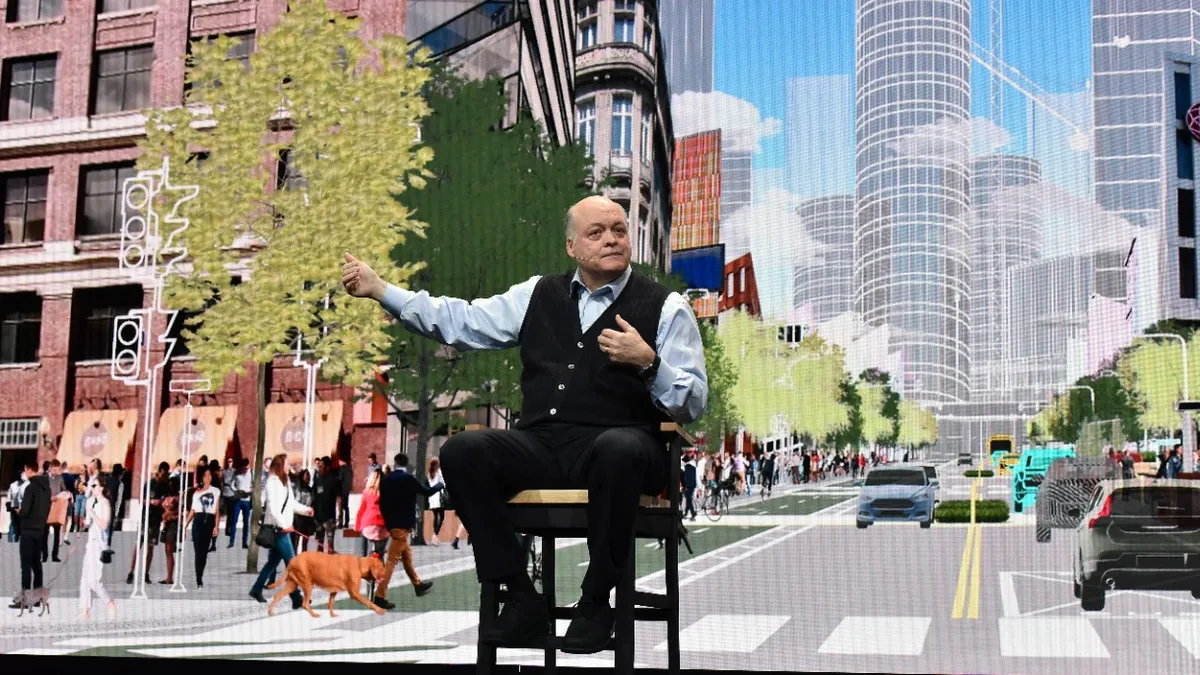Dive Brief:
- During a keynote speech at CES this week, Ford CEO Jim Hackett announced the automaker will work with Silicon Valley-based Autonomic to develop an open, cloud-based mobility service platform dubbed the "Transportation Mobility Cloud."
- The main objective of the cloud is to enable "transportation modes" in cities — including personal vehicles, ride-share services, bike-sharing networks, delivery services, buses and trains — to share information and streamline services more efficiently. The key to this information sharing will be cellular vehicle-to-everything (C-V2X) technology, which will allow "vehicles, stoplights, signs, cyclists and pedestrian devices" to communicate quickly and securely.
- In a Medium post, Ford's Mobility President Marcy Klevorn described the initiative as one that would "take back our streets," noting the benefits it could have on reducing congestion and optimizing AVs. "We aren't interested in developing self-driving vehicles to operate simply as isolated nodes in a massive transportation environment ... Inside an efficient, connected and optimized transportation system, this technology holds the promise for a whole new approach to moving goods, distributing content and serving humanity," she wrote.
Dive Insight:
Despite its 115-year-old roots, Ford has made strong efforts to stay at the forefront of innovation in the smart city world. Similar to competitors including GM and Nissan, Ford has bought in to the growing autonomous and electric vehicle movement, as well as the popularity of the shared economy, and has allowed these trends to unlock new business opportunities.
While car manufacturing is at the core of Ford's business, many mobility trends point toward the decline of car ownership — and toward the growing need of public-private partnerships for transportation solutions. In September 2016, Ford teamed up with San Francisco for two significant mobility-related investments: the acquisition of the crowd-sourced shuttle service Chariot, and a partnership with Motivate to launch Ford GoBikes. More city partnerships are likely to come.
In a blog post, Ford juxtaposed these unconventional business decisions with those that shaped the company more than 100 years ago. "Henry Ford drove a radical change at the start of the 20th century — a change that helped people all over the world follow their dreams and build better lives — through the freedom of transportation. We see this moment — right here, right now — in the same light," the post read.
Ford also announced this week a partnership with food delivery service Postmates to test how self-driving technology can enhance consumers' delivery experiences and "transform the way commerce moves" in communities. This partnership follows Ford's pilot with Domino's last year, which tested how customers interact with autonomous delivery services.
Through all of this innovation, Ford is demonstrating that a business is only as strong as its relevance in the current market — a lesson for all car manufacturers to take into account. And while Ford has lofty goals for its cloud initiative — TechCrunch reports the company is striving to be the smart city platform "with the most connected vehicles by the end of 2019," with an eventual 100% compatibility rate with all vehicles — the company's track record suggests these goals will likely be attainable.












